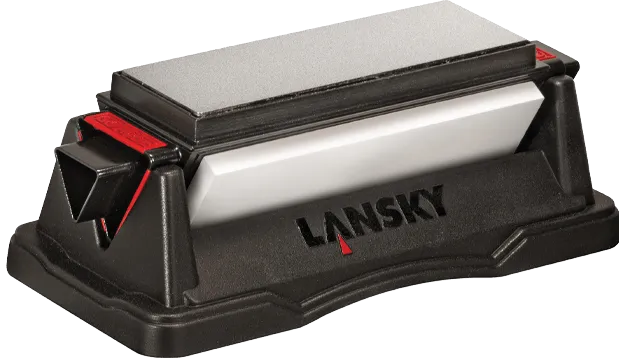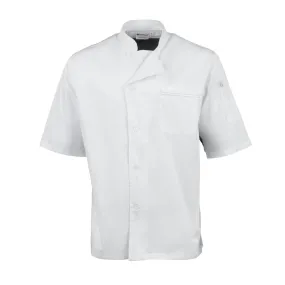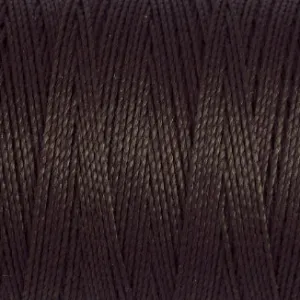A perfect workshop sharpening station. The tri-stone benchstone uses three different sharpening elements in one package for the best results when sharpening.
Details
- SKU: BSTR100
- Base/Handle Material: Plastic
- Features: Non-slip Base, Optional Mounting
- Grit: Coarse (120) Medium (280) Fine (1,000)
- Sharpener Length: 6 in (15.2cm)
- Sharpener Material: Alumina Oxide Ceramic Diamond
- Sharpener Width: 2 in (5.1 cm)
- Uses: Regular, Filet, Woodworking/Chisels
-Diamond Stone (100% coverage) for Fast Reconditioning - 120 coarse grit
-Alumina-Oxide Stone for Sharpening - 280 medium grit
-Ceramic Stone for Final Polishing - 1000 fine grit
-Screw holes included in base for easy bench mounting
-Non-slip rubber feet
Lansky delivers the most versatile 3 Stone Sharpener available, Combining 3 of our best stones: Diamond, Alumina-Oxide, and Ceramic. The result is a stand-alone, high-value sharpening center that will do it all, with better versatility than other similar products and last longer doing it. All sharpening surfaces measure 2" x 6".
-The continuous diamond surface (120 grit) will repair and re-profile extremely dull or damaged blades. This is not to be used every time, only on blades in need of serious repair or re-profiling.
-The long lasting Alumina-Oxide surface (280 grit) is where most your touch-ups will occur, before polishing it off with the ceramic side. This is most comparable to a traditional sharpening stone, producing a working-edge that is adequate for most cutting tasks.
-The Ceramic surface (1000 grit) is used for sharpening and finishing. This is what will turn a micro-serrated edge into a smooth, shaving-sharp, cutting edge. The type of edge you can confidently brag about.
The sturdy plastic base boasts a wide footprint with low-profile and non-slip rubber feet giving the Lansky Tri-Stone Benchstone greater stability, resulting in greater user satisfaction.
Instructions
USING YOUR TRI-STONE BENCHSTONE
Step 1- Select the proper stone for your edge.
Coarse Diamond Stone- For re-profiling a completely dull or damaged edge
Medium Alumina Oxide Stone- To maintain an undamaged, slightly dull edge
Fine Ceramic Stone- To hone/polish a finished edge
Step 2- Set the Tri-Stone Benchstone base on a stable, flat surface with the stone you have selected facing up.
Note- Lubrication of any kind is not recommended while sharpening on any of the three stones. DO NOT USE HONING OIL ON THE DIAMOND STONE.
Step 3- Observe the bevel angle on the blade you intend to sharpen. Then, bring the edge to the stone matching your sharpening angle to the bevel angle.
Step 4- Using light pressure, push the edge of the blade across the stone in one motion, much like trying to slice a thin layer off the top of the stone. Maintaining a consistent angle is essential for the best results.
Step 5- Repeat process 3-4 times on one side of the blade then switch to the other side and repeat.
Step 6- Repeat this process until edge is sharp then progress to finer stones and repeat.
Step 7- Clean your stones.
Clean the Diamond stone with a damp rag after each use.
Clean your Alumina Oxide stone with Nathan’s Honing Oil® after each use
Clean the Ceramic stone with the Lansky Eraser Block® after each use.
Suggestions
1. Use a series of stones for the best results. For an undamaged edge start with the Medium Alumina-Oxide stone.
2. Start with your selected stone. Use 3-4 strokes on one side of the blade. Repeat process on the other side of the blade. Repeat this whole process, switching between sides, about 3-4 times.
3. Then use only 2 strokes per side. Repeat this process 2-3 times.
4. Then 1 stroke per side. Repeat this process 1-2 times.
5. Move on to a finer stone.
Be Smart, Be Safe and Stay an Edge Above the Rest!
CAUTION: Knife sharpening is an inherently dangerous activity. Used properly this sharpener cannot hurt you but a carelessly handled blade or pointed object can.
BSTR100















